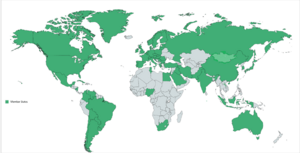UNIDROIT facts for kids
 |
|
| Abbreviation | UNIDROIT |
|---|---|
| Formation | 1926 |
| Type | intergovernmental Organization |
| Headquarters | Rome, Italy |
|
Membership
|
65 States (2023) |
|
Official language
|
English, French, Spanish, Italian, German |
|
Secretary General
|
Professor Ignacio Tirado |
|
President of the Governing Council
|
Professor Maria Chiara Malaguti |
| Website | https://www.unidroit.org/ |
UNIDROIT (which stands for the International Institute for the Unification of Private Law) is an international organization that helps countries agree on rules for private law. Think of it like a team that works to make sure laws about things like buying and selling, or contracts between people from different countries, are similar. This makes it easier for businesses and individuals to work together across borders.
UNIDROIT was first set up in 1926 as part of the League of Nations. After the League ended, UNIDROIT was restarted in 1940. As of 2023, 65 countries are members of UNIDROIT.
UNIDROIT creates different kinds of legal tools. Some are like international agreements called conventions (or treaties), which countries can sign to make them official laws. Others are soft law instruments, like the UNIDROIT Principles of International Commercial Contracts. These principles are like helpful guidelines that people can choose to use in their contracts, but they aren't strict laws unless everyone agrees to them. This is different from some other international laws, like the Convention on the International Sale of Goods (CISG), which apply automatically in certain situations.
Contents
Where is UNIDROIT Located?
The main office of UNIDROIT is in Rome, Italy. It's located in a beautiful old building called the Villa Aldobrandini. This villa is a 17th-century (that's the 1600s!) princely home. It's right next to the Pontifical University of Saint Thomas Aquinas.
How UNIDROIT Works
UNIDROIT has a special way of creating new legal rules and guidelines. It's a careful process that involves many steps and lots of experts.
Starting a New Project
When UNIDROIT decides to work on a new topic, its team first studies it carefully. They look at how different countries handle the issue and figure out if new rules are really needed and if they can actually be created. This study is then shown to the Governing Council, which is like UNIDROIT's main decision-making group. If the Council thinks it's a good idea, a special committee is formed to start writing a first draft of the new rules.
Getting Countries to Agree
Once a first draft is ready, the Governing Council reviews it. If it's a draft for a new international agreement (a convention), the Council usually asks for a group of government experts to meet. These experts, from different countries, work to finish the draft.
Representatives from all member countries can join these meetings. Other countries and international groups can also be invited to watch. When the draft is finished and everyone agrees, it's sent to a special meeting called a Diplomatic Conference. At this conference, countries can officially adopt the draft as an international convention.
Working with Other Organizations
UNIDROIT often works with other international groups. Three important organizations that work on private law are called "the three sisters": The Hague Conference on Private International Law, UNIDROIT, and the United Nations Commission on International Trade Law (UNCITRAL). UNIDROIT also helps other organizations by doing research or writing drafts for their international agreements.
Network of Legal Experts
To do its job well, UNIDROIT needs to know about laws in many different countries. Since getting all this information can be hard, UNIDROIT has a network of special helpers. These helpers are lawyers and legal experts from both member and non-member countries. They are chosen by the Governing Council and share their legal knowledge, helping UNIDROIT stay updated on laws around the world.
Member Countries
Countries become members of UNIDROIT by agreeing to its rules. As of 2023, there are 65 member countries:
| Member country | Year of joining |
|---|---|
| 1972 | |
| 1973 | |
| 1948 | |
| 1940 | |
| 1940 | |
| 1940 | |
| 1940 | |
| 1968 | |
| 1951 | |
| 1986 | |
| 1940 | |
| 1996 | |
| 1940 | |
| 1999 | |
| 1993 | |
| 1940 | |
| 1951 | |
| 2001 | |
| 1940 | |
| 1948 | |
| 1940 | |
| 1940 | |
| 1945 | |
| 1940 | |
| 1950 | |
| 2009 | |
| 1951 | |
| 1973 | |
| 1940 | |
| 1954 | |
| 1940 | |
| 1954 | |
| 2006 | |
| 2007 | |
| 1951 | |
| 1970 | |
| 1940 | |
| 2023 | |
| 1940 | |
| 1940 | |
| 1964 | |
| 1951 | |
| 1964 | |
| 1940 | |
| 1979 | |
| 1949 | |
| 1940 | |
| 1990 | |
| 1945 | |
| 2009 | |
| 2001 | |
| 2023 | |
| 1993 | |
| 1995 | |
| 1971 | |
| 1981 | |
| 1940 | |
| 1940 | |
| 1940 | |
| 1980 | |
| 1950 | |
| 1948 | |
| 1964 | |
| 1940 | |
| 1940 |
Some countries were members in the past but are not anymore. These include Ecuador (1940-1964), Lebanon (1958-1964), and Senegal (1991-1997). Also, some countries that no longer exist, like Czechoslovakia and Yugoslavia, were once members.
UNIDROIT's Legal Tools
UNIDROIT creates different types of legal tools to help make private law more uniform around the world.
International Conventions
These are like formal agreements or treaties that countries can sign. Once a country signs and approves a convention, its rules become part of that country's laws. Here are some examples of conventions created by UNIDROIT:
- Rules for International Sale of Goods (The Hague, 1964)
- Rules for Making Contracts for International Sale of Goods (The Hague, 1964)
- International Convention on Travel Contracts (Brussels, 1970)
- Rules for International Wills (Washington, D.C., 1973)
- Rules for Agents in International Sale of Goods (Geneva, 1983)
- Rules for International Financial Leasing (Ottawa, 1988)
- Rules for International Factoring (Ottawa, 1988)
- UNIDROIT Convention on Stolen or Illegally Exported Cultural Objects (Rome, 1995) - This helps return stolen art and historical items.
- Convention on International Interests in Mobile Equipment (Cape Town, 2001) - This helps with financing big, movable things like:
- Aircraft (2001)
- Railway Rolling Stock (trains) (2007)
- Space Assets (satellites) (2012)
- Mining, Agricultural and Construction Equipment (2019)
- Geneva Securities Convention (Geneva, 2009)
UNIDROIT also keeps the official copies of some of its conventions, like the Cape Town Convention and the Geneva Securities Convention.
Non-Binding Guidelines (Soft Law)
Besides conventions, UNIDROIT also creates "soft law." These are rules or guidelines that countries don't have to follow strictly, but they can use them as inspiration. They are like helpful suggestions for how to make laws or contracts. Examples include:
- The UNIDROIT Principles of International Commercial Contracts (updated in 1994, 2004, 2010, and 2016)
- Principles for how civil court cases should work across countries (2004)
- Model rules about who owns undiscovered cultural objects (2011)
- Guidelines for certain financial agreements (2013)
- A legal guide on contract farming (2015)
- Model European rules for civil court cases (2020)
- A legal guide for contracts about investing in farmland (2021)
See also
- Rome I Regulation
- Uniform act
- United Nations Commission on International Trade Law (UNCITRAL)
- World Trade Organization
 | Sharif Bey |
 | Hale Woodruff |
 | Richmond Barthé |
 | Purvis Young |


